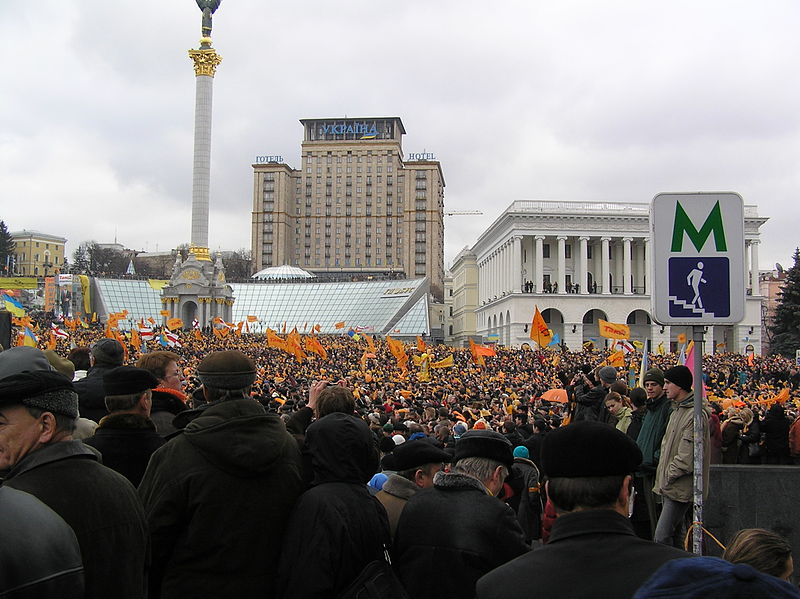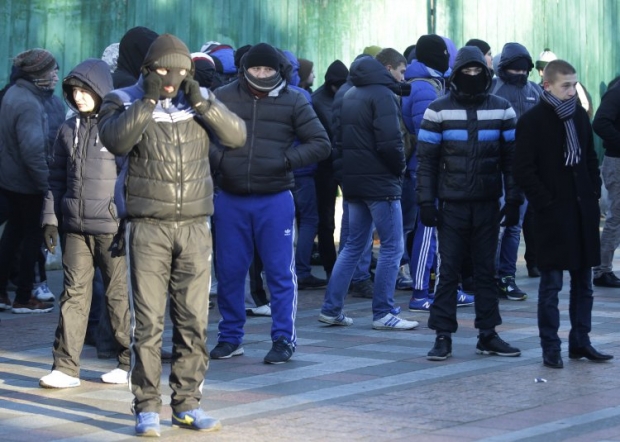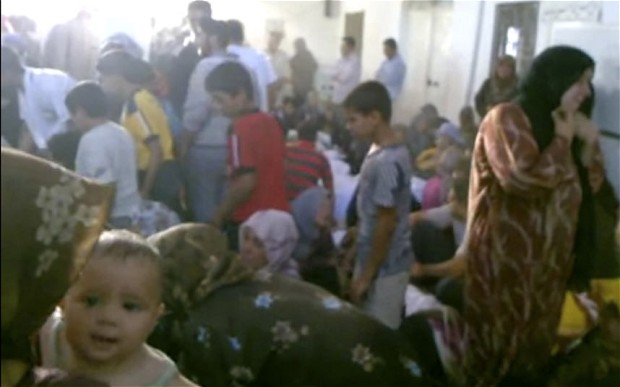by Daria Platonova

In 2014, language came to the forefront of politics in Ukraine for the second time since 2012 and with far serious consequences than before. After the flight of President Yanukovych on 21 February 2014, the new Ukrainian government provisionally repealed the 2012 Kivalov-Kolesnichenko law that granted Russian, among other minority languages, the status of the regional language in the east of Ukraine where it was most widely spoken. This had meant that Russian could be used at courts, schools, and businesses as the regional language in the east. People of the eastern cities and towns, such as Donets’k[1] and Kharkiv, took to the streets, protesting against the repeal with the slogans “Russian is our language”. Many appealed to Russia for help.
Radicals such as Donetsk Republic (a radical movement calling for the secession of the Donbas from Ukraine), who called the former President Viktor Yushchenko’s (2005 – 2010) language policies of Ukrainisation “the genocide of Russian speakers”, came to the forefront of the protest movement in Donets’k. The fact that the interim President Oleksandr Turchynov vetoed the repeal of the language law on 28 February 2014 and the new government pledged to revise its language policies failed to register with the people in the east, and the protests continued. These protests later morphed into an insurgency, with the help of Russian non-state actors, and led to the eventual secession from Ukraine of two regions, Donets’k and Luhans’k, in May 2014. The local elites in Donets’k lay the blame for these developments on Kyiv who, to them, pursued “incorrect policies” towards the east. In this article, I draw attention to somewhat more far-fetched but no less significant historical events. I present a comparative review of Russian and British imperial policies towards Ukrainian and Welsh respectively to demonstrate that empires would often suppress native languages in the public sphere in order to promote their lingua francas (most commonly spoken languages), for a variety of reasons.
Many Ukrainian nationalists, such as Ivan Dziuba, and the generations of Ukrainian writers since decried Russian imperial and later Soviet policies of russification which suppressed the use and development of Ukrainian. They emphasise how these policies damaged the development of Ukrainian identity. In the 21st century, language in Ukraine became a plaything of various political forces, such as the Party of Regions, who would often campaign with a promise to make Russian the official language of Ukraine, only to renege on their promises once in power. By contrast, President Yushchenko (2005 – 2010) pursued consistent policies of Ukrainisation, making Ukrainian the official language of the public sphere and all levels of education, which was used as a negative campaign ploy by the Russophone Viktor Yanukovych in his presidential election campaign before he was elected President in 2010. I argue that when it comes to the language policies in the Russian Empire, it was not alone in suppressing local native languages.
Ukrainian in the Russian Empire
In the second half of the 19th century, the Russian imperial bureaucracy began to target the Ukrainian or Little Russian language and Ukrainophiles (the promoters of the Ukrainian culture and language), such as Mykhailo Drahomaniv, systematically. Alexei Miller has written extensively on the origins, successes, and failures of these policies. Thus, in 1863, the Russian imperial bureaucracy issued the so-called Valuev circular, which aimed at curbing publications in Ukrainian intended for primary mass reading, including textbooks and religious texts. It also prohibited primary education in Ukrainian. Miller and other historians such as Olga Andriewsky trace the origins of the circular to the political situation in the Russian empire, such as the Polish Uprising of 1863 and Russia’s defeat in the Crimean war.[2] Valuev himself thought of the Ukrainian language as “a Polish tool in the struggle against the Empire”. The makers of the circular argued that the language “has never existed and, despite all the efforts of the Ukrainophiles, “still does not exist“.
Miller traces the origins of the second significant legislation, the Ems edict or ukaz, to the concern about the “manifestations of Ukrainophile activities, such as book publications in the Little Russian (malorusski) dialect (or Ukrainian)”. One of the explanatory notes to the edict that was finally issued in 1876 tellingly says, “The emergence of literature among Latvians can be considered as safe for the unity and integrity of Russia. On the contrary, it would be the greatest political imprudence to allow a separation of 13 million Little Russians by the means of giving the Ukrainian dialect the status of a language of high culture”. Further, the note maintained the central role of the Little Russia in the Russian-Polish conflict, saying “if the Little Russia becomes Polish again, the present greatness of the Russian state would be in grave danger”. The Ukrainophile movement was consequently labelled “the brainchild of the Austrian-Polish intrigue” that endangered the unity and integrity of Russia.
Hence, according to the Ems circular, the publication of literature in Ukrainian, with the exception of ancient texts and works of fine literature, was circumscribed; literary imports from abroad were forbidden; Ukrainian literature was now completely under control of the Chief Directorate on Publications. Miller shows how the imperial bureaucracy sought to minimise the grammatical and orthographical differences between Russian and Ukrainian. Other parts of the edict prohibited elementary instruction in Ukrainian as well as led not only to the closure of the Ukrainophile Kyiv Geographical Society but also the immediate exile of Ukrainophiles Drahomaniv and Chubinskiy. Thus, between 1896 and 1900, the Kyiv censorship committee forbade 15% of Ukrainian publications every year, compared to 2% of publications in other languages. Russian remained the language of administration, economy and mass communication. This was particularly true in the great cities of Kyiv and Odessa.
Welsh in the British Empire
In his book on the Ukrainian question, Miller notes that in France and Britain similar assimilatory processes took place over the 19th century and early 20th century, but there were no attempts to restrict minority-language publications through censorship. Assimilation was practised primarily through schools and in the workplace. In fact, in the 18th century, elementary education in Welsh flourished. Yet, by the 19th century political instability (Jacobin revolts) hit the schools hard. By the early 20th century, like Ukrainian, Welsh became associated with peasantry, working classes and, above all, urban disorder and political instability. In the industrial south-east (almost a mirror image of the rural Ukraine), there was a large “unstable” working-class population. Many of them were not Anglicans and most of them did not speak English as their first language. In 1800 – 1, there was a revolt over food prices, and massive demonstrations against wage cuts took place in 1816. Overall, riots were endemic in the 19th century in Wales. After one such riot, called the Newport Rising in 1839, the failure of the authorities to identify the instigators was attributed to the language barrier.
In 1847, the government inquiry into the state of education in Wales led to the publication of the so-called “Blue Books” in which “the Welsh were portrayed as ill-educated, poor, dirty, unchaste and potentially rebellious”, while the Welsh language was described as “the great evil”. Evans writes that the Welsh language and Nonconformity were made to carry most of the blame for the poor state of Wales. The books paved the way for government and state intervention in education so that by 1870 a wholly English system of instruction could be applied to Wales under Forster’s Education Act of the same year. The Reports also reduced the self-confidence of Welsh people and created in many quarters a strong sense of national inferiority.
In the 1850s and 1860s, Evans writes that “there occurred a massive cultural and political shift … and the Welsh were encouraged to forget their past with its passion for poetry, legend and history. The new emphasis was on practical knowledge, industriousness, progress, the language of success and the Victorian ethos of self-improvement”. Schools and parents became resistant to the introduction of Welsh because it prevented further integration with England and career success. Thus, a Welsh-speaking Anglican clergyman, the Revd Shadrach Pryce, considered the Welsh language to be useless in educational terms. Many were of the view, for example the rector of Merthyr Tydfil Revd Daniel Lewis, that the introduction of Welsh in the schools was dangerous and undesirable: “the language is a spoken one; it has really no body of literature of its own”, except for “very feeble poetry”. This is eerily reminiscent of the key Ukrainophile Mykhailo Drahomaniv’s remark that if Ukrainian was to become the chief language of instruction in Ukraine, the pupils would be put on the literary “St Anthony’s diet”.
By the early 20th century, due to the rapid urbanisation, English became “the language of advancement and promotion”, just as Russian was in the Russian Empire. Pupils at schools were learning English and its enforcement became associated with physical punishments, such as the infamous Welsh Knot. Smith writes,
“Welsh was not accorded any status as a medium of official business, nor the language of genteel society, nor of the expanding commercial and industrial world, and neither was it the language of academia and learning. Indeed, the domain of the Welsh language was increasingly limited to domesticity and religious worship, and it was regarded as a hindrance rather than an advantage to personal advancement and social progress”.
Thus, according to the calculations of E.G.Ravenstein, 71.2 per cent of the population of Wales was able to speak Welsh in 1871. By 1901, this figure was slightly less than half of the population . According to J. Southall’s Wales and Her Language published in 1892, Welsh was becoming disused and many children were becoming ashamed of their native tongue. Smith concludes that the opposition to the Welsh language reflected underlying social attitudes rather than any specific language policy. In contrast, the Russian imperial government pursued specific language policies towards Ukrainian, as later did the Ukrainian government towards the official language of the country and other languages.
Conclusion
In the 21st century, language remained an important issue in Ukraine and it became entangled with politics. This has deeper historical roots as the Ukrainian language was also a deeply political issue for the Russian bureaucracy in the Russian Empire. Two edicts forbade publications for mass reading in Ukrainian and instruction in the language. It was deemed that the development of Ukrainian endangered the Russian Empire as it was associated with “Polish intrigues”. Similarly, Welsh language became associated with the “unstable” working classes and urban riots in the British Empire. Publications in Welsh were not forbidden as such, but the language was gradually suppressed in schools. English became the language of career advancement and increasing urbanisation. In both empires, the lingua francas became unassailable by the minority languages by the early 20th century. By the time of its independence, the Ukrainian government therefore faced with the legacy of the Russian imperial policies towards Ukrainian the impact of which it persistently strove to override.
[1] I have used the Ukrainian spelling in line with the established academic practice.
[2] Olga Andriewsky, “The Russian-Ukrainian discourse and the failure of the Little Russian solution, 1782 - 1917” in A. Kappeler et al., eds. Culture, Nation, and Identity: the Ukrainian-Russian encounter
Daria is a PhD student at King’s College London. Her research focuses on violence and the unfolding of conflict across several regions in eastern Ukraine, 2013 – 2014. She also leads one of the Causes of War seminars in the War Studies Department. Prior to joining King’s, she worked as a teacher. She graduated with a degree in History from the University of Cambridge in 2011. Her broader interests include European history, war studies, and interdisciplinary methods.





